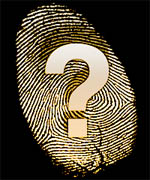 Identity theft is America's fastest-growing crime. In 2004, almost 10 million people
were victims of identity theft. The total cost to consumers and businesses was nearly
$5 billion although these figures are probably higher.
Identity theft is America's fastest-growing crime. In 2004, almost 10 million people
were victims of identity theft. The total cost to consumers and businesses was nearly
$5 billion although these figures are probably higher.
Identity theft is a serious crime. It occurs when someone uses your personal information
without your permission to commit fraud or any other crime. Only one bit of personal
information is all somebody needs to steal your identity. Although it is almost
impossible to completely avoid being victim, there are steps you can take to minimize
your risk:
- Place passwords on your credit card, bank, and phone accounts. Try not to use information
like your mother's maiden name, your birth date, the last four digits of your Social
Security number.
- Secure personal information in your home, especially if you have roommates, employ
outside help, or are having work done in your home.
- Don't give out personal information on the phone, through the mail, or over the
Internet unless you initiated the contact or you are absolutely certain that you
know who you are dealing with. Identity thieves are clever, and will present themselves
as bank representatives to get people to reveal their Social Security number, mother's
maiden name, account numbers, and other identifying information. Before you share
any personal information, confirm that you are dealing with a legitimate organization.
- Treat your mail and trash carefully. To thwart an identity thief who may pick through
your trash or recycling bins to capture your personal information, destroy your
charge receipts, checks and bank statements, credit applications, insurance forms,
doctor statements, expired charge cards, and anything else that can provide personal
information. To opt out of receiving offers of credit in the mail
- Deposit your outgoing mail in post office collection boxes or at your local post
office, rather than in an unsecured mailbox. Promptly remove mail from your mailbox.
If you're planning to be away from home and can't pick up your mail, contact the
U.S. Postal Service to request a vacation hold or have somebody you trust collect
it.
- Don't carry your Social Security number card. Carry only the identification information
and the credit/debit cards that you'll actually need when you go out.
- Give your Social Security number only when absolutely necessary, and ask to use
other types of identifiers.
- Be cautious when responding to promotions. Identity thieves may create phony promotional
offers to get you to give them your personal information.
- Order a copy of your credit report. An amendment to the federal Fair Credit Reporting
Act requires each of the major nationwide consumer reporting companies to provide
you with a free copy of your credit reports, at your request, once every 12 months.
Under New Jersey State law, consumers have free access to their credit reports.
Use any of the three credit reporting companies listed below.
If you think your identity has been stolen, here's what to do:
-
Contact the fraud departments of any one of the three consumer reporting companies
to place a fraud alert on your credit report:
- Equifax: 800-685-1111 (www.equifax.com)
- Experian: 888-397-3742 (www.experian.com)
- TransUnion: 800-916-8800 (www.transunion.com)
The fraud alert tells creditors to contact you before opening any new accounts or
making any changes to your existing accounts. You only need to contact one of the
three companies to place an alert. The company you call is required to contact the
other two, which will place an alert on their versions of your report, too. Once
you place the fraud alert in your file, you're entitled to order free copies of
your credit reports.
- Close the accounts that you know or believe have been tampered with or opened fraudulently.
- File a report with the North Bergen Police or the police department in the community
where the identity theft took place. Get a copy of the report or at the very least,
the number of the report, to submit to your creditors and others that may require
proof of the crime.
- File your complaint with the FTC. The FTC maintains a database of identity theft
cases used by law enforcement agencies for investigations. Filing a complaint also
helps us learn more about identity theft and the problems victims are having so
that we can better assist you.
For more information on preventing or recovering from identity theft, visit the
Federal Trade Commission or the United States Postal Service web site.